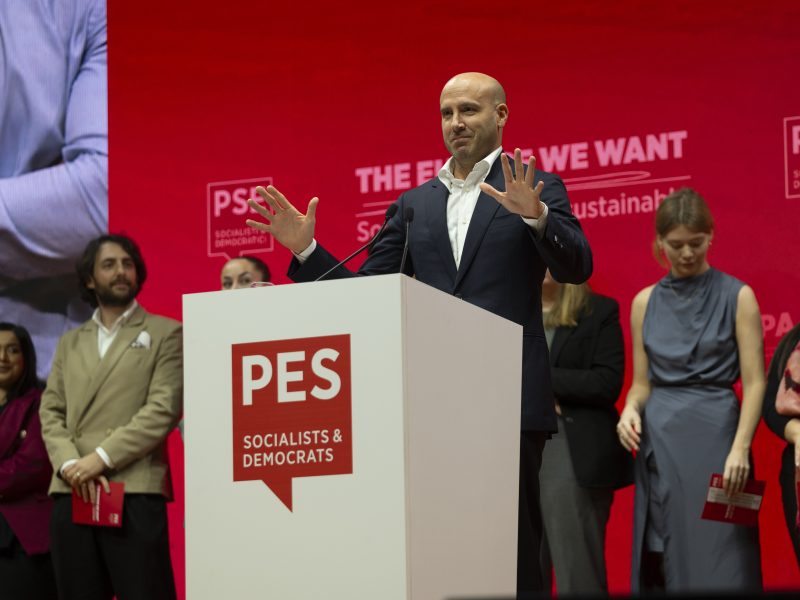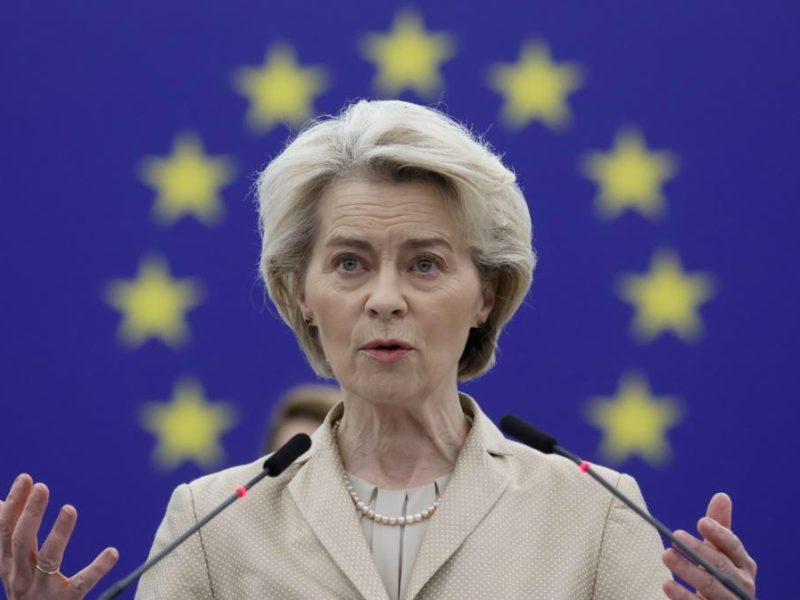Der Spitzenkandidat der Sozialdemokratischen Partei Europas, Nicolas Schmit, ist wütend über die Kommissionspräsidentin und Spitzenkandidatin der Mitte-Rechts-EVP-Partei Ursula von der Leyen. Wer ging; wer verließ; wer ließ Die Tür öffnet sich für die Zusammenarbeit mit der Ferne Rechts im Europäischen Parlament nach den Wahlen.
Die beiden stießen bei der Maastricht-Debatte zusammen, die von Politico Europe und Studio Europe Maastricht gemeinsam organisiert wurde, einer von zwei Debatten zwischen Parteien. SpitzenkandidatenDie nächste Veranstaltung ist für den 23. Mai im Europäischen Parlament geplant und wird von der European Broadcasting Union organisiert.
Von der Leyen ließ die Tür für eine Zusammenarbeit mit der rechtsextremen Gruppe Europäische Konservative und Reformisten (ECR), der politischen Familie der italienischen Premierministerin Giorgia Meloni, offen.
„Es hängt sehr davon ab, wie die Konkurrenz des Parlaments ist und wer in welcher Fraktion ist“, sagte von der Leyen und fügte hinzu: „Es ist das Parlament, das Mehrheiten schafft“, als er direkt von Bas Eickhout von den Grünen gefragt wurde.
Schmit schwieg während der gesamten Debatte weitgehend, intervenierte jedoch, um von der Leyen zur Rede zu stellen.
„Ich bin etwas erstaunt über Ihre Antwort, das war etwas seltsam, denn Werte und Rechte können nicht nach einer politischen Vereinbarung definiert werden. Entweder kann man sich mit der extremen Rechten auseinandersetzen, weil man sie braucht, oder man sagt klar, dass es keine Einigung gibt.“ „Das ist möglich, weil sie die Grundrechte, für die unsere Kommission gekämpft hat, nicht respektieren“, sagte er.
Es ist nicht das erste Mal, dass die EVP ihren Willen zum Ausdruck bringt, mit der extremen Rechten zusammenzuarbeiten.
Euractiv berichtete im März, dass die Bildung einer Pro-EU-Koalition zwischen der EVP, der S&D und der liberalen Renew nicht einfach sein werde.
In einem Interview mit Euractiv am 4. März sagte EVP-Generalsekretär Thanasis Bakolas, dass es „gesunde“ Elemente auf der rechten Seite geben werde, die die roten Linien der EVP unterstützen würden.
„Wir müssen uns ansehen, wer diese politischen Elemente sind, und ihnen helfen, sich von der extremen Rechten abzugrenzen [… because if they look at us, essentially it means they are looking to be distinguished from the far right elements, that do not define the tenets that I just described pro-Europe, pro-NATO, pro-Ukraine.”
He warned, however, that this will take time.
“It takes time to politically position oneself and adjust, and we will see who these political elements are and how they position themselves. But, you know, the day after the elections, we need a majority to get the job done regarding the top positions, the Commission and the other institutions. The timing of the two is not necessarily something that’s going to coincide”.
Bakolas’ comments triggered the reaction of his socialist counterpart Giacomo Filibeck, who told Euractiv that his party would not negotiate a pro-EU majority if any member from the European Conservatives and Reformists Group (ECR) or far-right Identity and Democracy were also involved,
“I have to be clear: The European People’s Party (EPP) can talk to whoever they want, but among those who will gather around the table for negotiations for a pro-European majority following the results of the next elections in the European Parliament, will not be ECR or ID people.”
According to the latest projections from Europe Elects, the EPP is estimated to get 183 seats, followed by the S&D with 140 seats and Renew with 86.
Altogether, these parties could get 409 seats, forming a safe pro-European majority in the EU House.
Not all EPP members see a potential collaboration with Meloni’s ECR in a positive light.
EPP Group Vice-President and Romanian MEP Siegfried Mureșan recently denied that Meloni’s party Fratelli d’Italia is a pro-European force and insisted on a pro-EU coalition with the socialists and liberals.
However, he noted that no legislation will pass against EPP’s will.
“So the majority will be the same, but with a strengthened EPP and with no possibility for the socialists to outvote the EPP with the other left parties,” he said.
Russian interference
Russian interference was one of the central topics during the debate, with the whole political spectrum teaming up against the Identity and Democracy group (ID), which has been recently at the epicentre of Russian interference and Chinese espionage scandals.
Von der Leyen used the matter to snap back at her critics.
“I see what the AfD colleagues have done; they are under investigation for being in the pocket of Putin, and if you look at the electoral programme, you will see they echo the lies and the propaganda of the Kremlin, so clean up your house before you criticise us!” she said.
Meanwhile, ID’s Vistisen responded, “You have to combat it [corruption/foreign interference]man muss dagegen ankämpfen, aber was Sie tun, ist, dass Sie einen Gleichstand zwischen legitimer Kritik an einer föderalistischen Europäischen Union und Desinformation herstellen. Ich habe heute keine Desinformation durchgeführt“, und greift auch die Sozialisten für die Beteiligung einiger ihrer Europaabgeordneten an Qatargate an Von der Leyens Pfizergate-Skandal.
[Edited by Alice Taylor | Euractiv.com]




